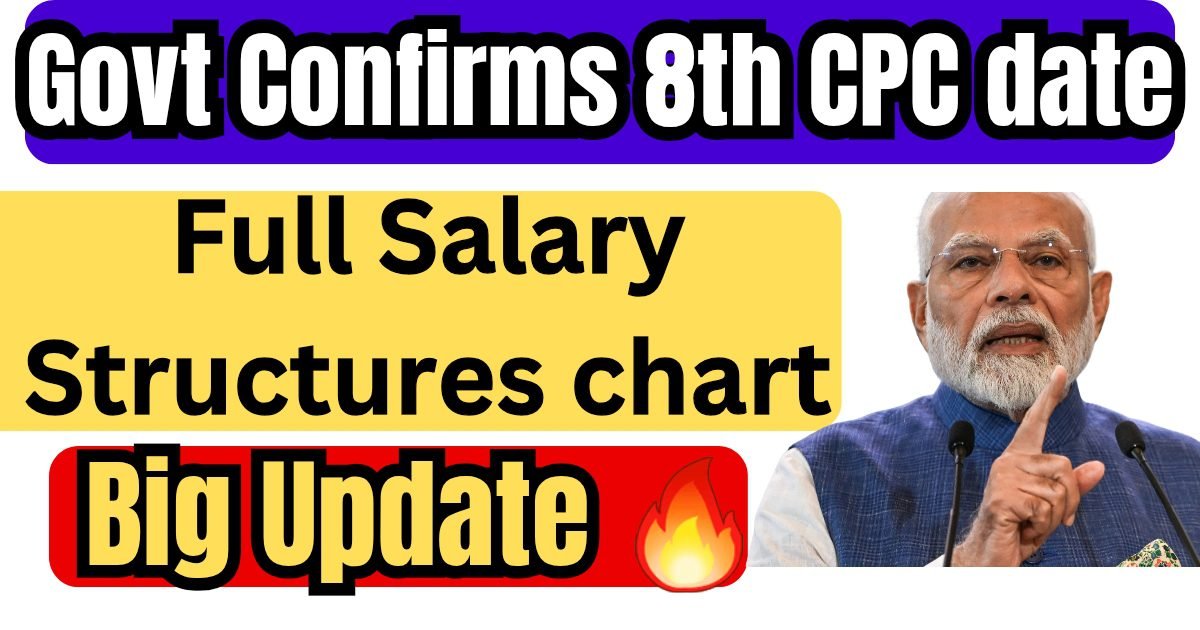The Indian government has officially announced the implementation of the 8th Pay Commission. This is a big step to improve the living standards of government employees across the country.
This move is expected to boost the morale and productivity of government employees. It aims to solve the problem of salary stagnation and ensure fair compensation.
The new pay structure is designed to provide a more equitable and efficient compensation package. It considers the diverse needs of employees across different grades and departments. This will lead to a significant salary hike for many.
Table of Contents
Breaking News: 8th Pay Commission Salary Hike Officially Announced
The government has made a big announcement. Starting in January 2024, there will be a salary increase for government workers. This is great news for those who work for the government, as their pay will go up a lot.
Key Highlights of the Announcement
The main points of the announcement are exciting. Government employees will see their salaries go up by 20-25%. This should make them happier and more productive at work.
- Implementation date: January 2024
- Average salary increase: 20-25%
- Revised allowances and benefits
Official Implementation Timeline
The government has a plan for when this will happen. By January 2024, the new pay system will be in place. All changes will be made by then.
Government’s Strategic Objectives
The main goal of the 8th Pay Commission is to help government workers. The government wants to make their lives better by giving them a big raise. This should make them happier and more productive.
Complete Salary Structure Chart: Grade-wise Breakdown
A new salary structure chart has been released. It shows the pay matrix for all levels. This chart breaks down pay scales for government employees, making compensation clear and transparent.
The new chart helps employees understand their career and financial planning better. It includes more levels in the pay matrix. This ensures clearer differences between roles and responsibilities.
| Grade | Basic Pay Scale | Grade Pay | Total Salary |
|---|---|---|---|
| 1 | 18,000 – 56,900 | 2,400 | 34,400 |
| 2 | 19,900 – 63,200 | 2,800 | 38,400 |
| 3 | 21,700 – 69,100 | 3,200 | 43,200 |
| 4 | 25,500 – 81,100 | 3,600 | 50,400 |
The breakdown shows how the new structure affects salaries and benefits. Changes in grade pay, increment rates, and allowances make compensation fairer and more efficient.
Now, government employees can plan their careers and finances with more confidence. The detailed breakdown helps them understand their salary growth. This knowledge aids in making informed career choices.
Historical Perspective: From 7th to 8th Pay Commission
It’s important to know the history of pay commissions to understand the 8th Pay Commission’s role. Moving from the 7th to the 8th Pay Commission is more than just a salary update. It’s a big change aimed at making government employees’ pay better overall.
Major Changes in Basic Pay Structure
The 8th Pay Commission has made big changes to the basic pay structure. These changes are based on the 7th Pay Commission’s work. The goal is to make sure government employees get fair and equal pay.
- Revision of pay scales to account for inflation and cost of living adjustments
- Inclusion of new allowances to support employees in various categories
- Streamlining of the pay structure to reduce anomalies and promote transparency
Allowance Modifications
The 8th Pay Commission has also updated the allowance structure. These updates meet the changing needs of government employees. They aim to offer better support.
Some key changes include:
- Enhancements to travel allowances to keep pace with rising transportation costs
- Introduction of new allowances for specific categories of employees, such as those working in high-cost areas or undertaking hazardous duties
- Rationalization of existing allowances to eliminate redundancy and ensure that they serve their intended purpose effectively
Pension Benefits Revision
The 8th Pay Commission has looked at pension benefits again. They want to make sure retired government employees get a fair pension. The changes aim to be fair and meet pensioners’ needs.
Key aspects of the pension benefits revision include:
- Revision of pension formulae to ensure that pensioners receive a fair percentage of their last drawn salary
- Introduction of measures to protect pension benefits from inflationary erosion
- Simplification of pension procedures to reduce bureaucracy and enhance the overall experience for pensioners
Additional Benefits and Allowances Under New Structure
The 8th Pay Commission has brought in a new structure. It includes extra benefits and allowances for government workers. This change aims to make the compensation package better, especially for those in tough areas.
This new structure has special rules for remote and hardship postings. It acknowledges the challenges faced by employees in these spots. These rules will make the compensation package more appealing, helping to keep and attract the best talent.
Some of the key additional benefits and allowances include:
- Enhanced hardship allowance for employees serving in remote and challenging areas
- Increased travel allowance for official trips
- Improved leave travel concession for employees and their families
| Allowance Type | Previous Rate | Revised Rate |
|---|---|---|
| Hardship Allowance | 10% of basic pay | 15% of basic pay |
| Travel Allowance | ₹1,000 per trip | ₹1,500 per trip |
| Leave Travel Concession | ₹2,000 per year | ₹3,000 per year |
The introduction of these benefits and allowances is expected to boost morale and productivity. The government wants to show appreciation for the hard work and dedication of its employees. It aims to provide a more comprehensive and supportive compensation package.
Economic Impact and Future Outlook for Government Employees
The 8th Pay Commission is set to boost the spending power of government employees. This means they will have more money to spend, leading to higher demand for goods and services.
This increased demand will likely drive investment in real estate and financial markets. As a result, the economy is expected to grow. This growth will make the future brighter for government employees and the economy as a whole.
Government employees have a promising future ahead. They will have more money to spend, which will improve their living standards. This extra money can also be used for important investments, like education and healthcare.
With the 8th Pay Commission in place, the economy is expected to see positive changes. Government employees will be the main winners, enjoying better financial stability and increased spending power.
Read also: Fitment Factor Increased in 8th CPC









